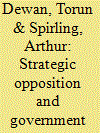| Srl | Item |
| 1 |
ID:
137060


|
|
|
|
|
| Summary/Abstract |
Are democracies better at winning wars and militarized disputes? Is there an advantage associated with initiating a war or dispute? Noting that pairwise contest data are the norm in applied research, we motivate a straightforward Bradley–Terry statistical model for these problems from first principles, which will allow for a closer integration of theoretical and statistical practice for scholars of international relations. The essence of this approach is that we learn about the latent abilities of states from observing conflict outcomes between them. We demonstrate the novelty and appeal of this setup with reference to previous attempts to capture estimands of interest and show that for many questions of concern—especially regarding “democratic effectiveness” and “initiation effects”—our approach may be preferred on theoretical and statistical grounds. The evidence we find only partially supports the ideas of “democratic triumphalists”: democracy aids effectiveness, but only in certain contexts (while in others it actually impairs fighting ability). We also provide estimates of possible “initiation effects,” and show that moving first seems to carry little advantage in interstate wars, but a substantial one in lower-level disputes.
|
|
|
|
|
|
|
|
|
|
|
|
|
|
|
|
| 2 |
ID:
110533


|
|
|
|
|
| Publication |
2011.
|
| Summary/Abstract |
Cohesive government-versus-opposition voting is a robust empirical regularity in Westminster democracies. Using new data from the modern Scottish Parliament, we show that this pattern cannot be explained by similarity of preferences within or between the government and opposition ranks. We look at differences in the way that parties operate in Westminster and Holyrood, and use roll call records to show that the observed behavior is unlikely to be determined by preferences on any underlying issue dimension. Using a simple variant of the agenda-setting model-in which members of parliament can commit to their voting strategies-we show that the procedural rules for reaching collective decisions in Westminster systems can explain this phenomenon: in the equilibrium, on some bills, members of the opposition vote against the government irrespective of the proposal. Such strategic opposition can reinforce government cohesiveness and have a moderating effect on policy outcomes. We introduce new data from the House of Lords, the Welsh Assembly, and the Northern Ireland Assembly to distinguish our claims from competing accounts of the data.
|
|
|
|
|
|
|
|
|
|
|
|
|
|
|
|